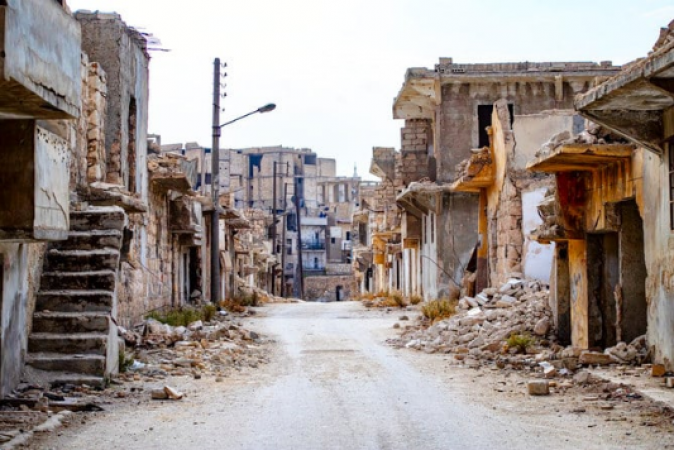
Syria: On January 22, at 2:30 a.m., tragedy struck Sheikh Maksoud, an area of Aleppo, Syria, with a significant Kurdish population. Numerous residents were buried under a mountain of debris when a five-story residential building collapsed.
16 bodies were found after 24-hour rescue efforts, and two survivors were taken to the local hospital for treatment. The foundations of the building had reportedly been weakened by water leakage, according to state media.
The neighbourhood of Sheikh Maksoud is struggling to survive under a crushing siege imposed by both opposition and regime groups, and this latest disaster is just the latest in a string of tragedies for the locals.
Also Read: widespread opposition to the Danish government's plans to abolish holidays
Aleppo, which was once a thriving centre for trade, tourism, and culture, has changed over the past ten years from that to a battleground, leaving much of the city in ruins.
Syria's second-largest city started to rebuild gradually as the frontline moved to new locations. However, the autonomous enclave of Sheikh Maksoud on the city's northwest outskirts continues to struggle for survival.
The residents of Sheikh Maksoud have tried their best to carry on with daily life despite the fact that half of the 2-square-kilometer neighbourhood has been left destroyed as a result of years of fighting between opposition groups and the neighborhood's self-defense militias.
The Fourth Division of the regime, which is supported by Iran, has been particularly brutal in depriving the neighborhood's residents of everything over the past year, including fuel, food, and even medicine.
Because we don't have any fuel, we have been burning trash. I got a chest infection as a result. When Arab News visited Sheikh Maksoud in December, one resident revealed, "I've been to the hospital twice this week.
The neighbourhood has been without fuel for more than 50 days, according to Merai Sibli, a member of the General Council of Sheikh Maksoud and Ashrafiyah. As a result, residents frequently only have access to an hour or less of electricity per day as their personal generators run out of fuel.
"Fuel is not available. Children and the elderly struggle to survive the cold, according to Sibli. "Here, they don't even let medicine pass. It costs a lot to pass what is allowed. When they stopped supplying us with flour six months ago, all bakeries were shut down.
Also Read: For an unexpected meeting with the king Netanyahu travels to Jordan
Sibli claims that the Fourth Division charges up to SYP2.5 million (more than $380) for each fuel truck that enters the neighbourhood. This is a hefty fee given that the average monthly wage in Syria is only SYP150,000 (roughly $23).
All of our young people will eventually be out of work and forced to sit at home in the dark as our factories and tailors close down due to a lack of electricity.
The origins of the Fourth Division can be traced to the 1980s, when Rifaat Assad, the brother of Hafez Assad, fled the nation and his paramilitary organisation, the Defense Companies, disintegrated into numerous militias.
These groups would eventually come together to form the Fourth Division, which was later employed to put an end to uprisings in Daraa, Baniyas, Idlib, and Homs at the outset of the Syrian crisis. A 2011 Human Rights Watch report details the Fourth Division's complicity in a number of violations, including the killing of protesters and arbitrary detentions.
Maher Assad, the younger brother of Syrian President Bashar Assad, serves as the division's de facto commander. According to a report by the Lebanese newspaper Al-Modon, Iran has been providing the Fourth Division with material, financial, and advisory support since the beginning of Iran's intervention in the Syrian civil war.
Early in the war, internal strife and defections overwhelmed the Syrian military, and the Fourth Division suffered as a result. The Fourth Division, like many other Syrian army units, was compelled to rely on Iranian militias to increase its power.
Not just Sheikh Maksoud is under siege by the Fourth Division. It extends into the Shahba area, which is in the northern countryside of the city, halfway between Afrin and Aleppo. Within Shahba are the towns of Tel Rifaat (population: 18,500, of which 15,700 are internally displaced people, or IDPs), and five camps, which collectively house thousands of Afrin-area IDPs.
Photos of Iran's Supreme Leader Ayatollah Ali Khamenei are displayed next to pictures of Bashar and Hafez Assad at some regime checkpoints in Shahba.
"No one is enlisting in the Syrian army any longer. All of their soldiers are mercenaries from Iran. According to Muhammad Hanan, the co-chair of the Tel Rifaat district, when those mercenaries arrive here, their goal is to take everything and give it to the state.
Hanan clarified that between Tel Rifaat and Aleppo, the Iranian militia presence in the Shahba region primarily serves to safeguard the Shiite-majority towns of Nubl and Zahraa.
Also Read: Tsai Ing-wen: War with China 'not an option'
Opposition groups ruled the area from 2013 to 2016, but were driven out by the Kurdish-led People's Protection Units, or YPG. The region's small towns and villages were the main locations of the Syrian state's military presence at the time.
However, following the Turkish invasion of Afrin in 2018, government forces—and subsequently, Iranian mercenaries—started to increase in strength under the cover of defending the area from Turkish-backed opposition groups.
"In the end, they have nothing to defend. "Up to this point, the Syrian state has exploited every opening to weaken us and annex the entirety of Shahba," said Hanan.
Hanan and other local officials told Arab News that the regime's checkpoints prevent the region from receiving critical aid from the UN and other NGOs.
The Fourth Division of the regime has blocked off the roads. You have to give them a cut if you want to bring something in from the outside, like fuel or propane. Dr. Azad Resho, the head of Shahba's Avrin Hospital.